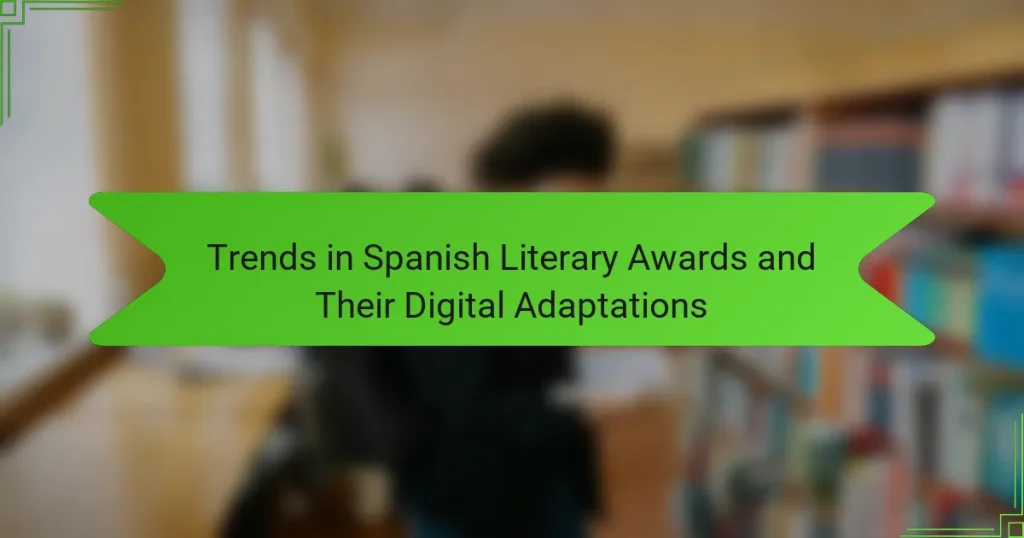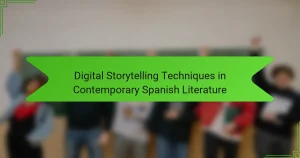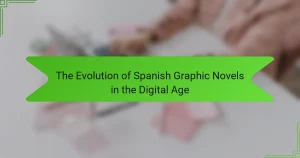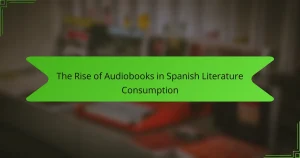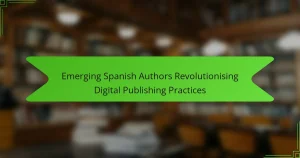Spanish literary awards are evolving through digital adaptations that enhance accessibility and engagement. This article explores how online platforms and social media campaigns expand participation, promote community interaction, and streamline award processes. It also examines the significance of innovation in traditional literary recognition and highlights emerging trends in inclusivity and self-publishing. Finally, the unique attributes of specific awards and strategies for optimizing engagement in the digital landscape are discussed.
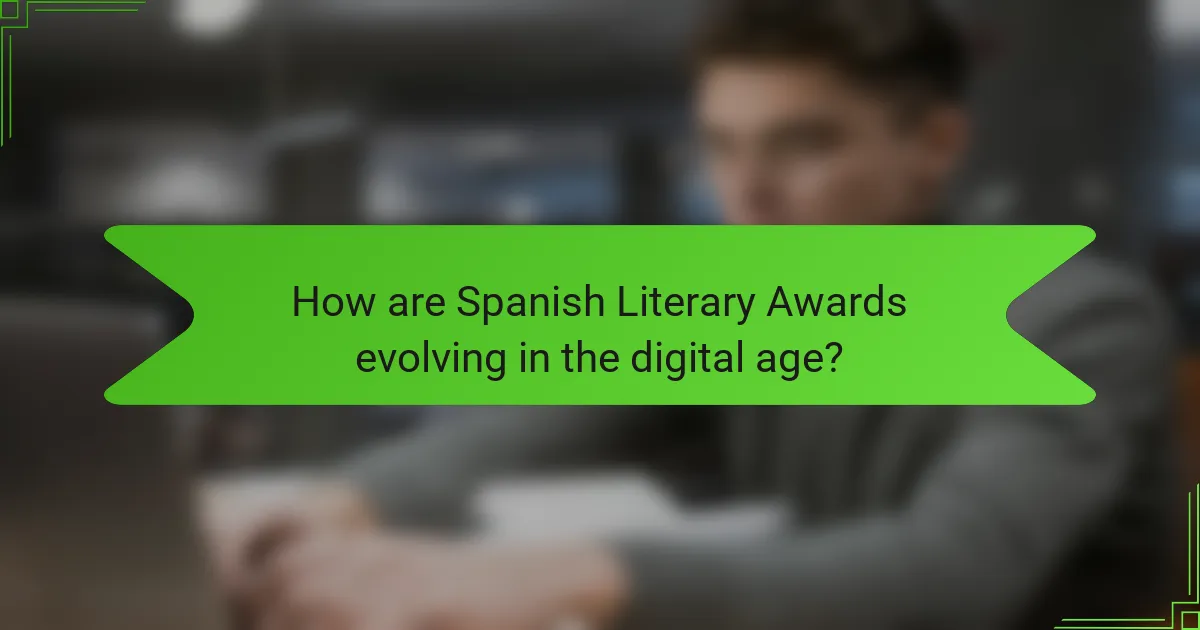
How are Spanish Literary Awards evolving in the digital age?
Spanish literary awards are increasingly embracing digital innovations to enhance accessibility and engagement. Online platforms have expanded participation and visibility for authors, allowing for broader audience reach. Social media campaigns promote real-time interaction, fostering community among readers and writers. Additionally, virtual ceremonies and online voting systems have streamlined processes, adapting to contemporary preferences. The integration of digital tools reflects a unique attribute of evolving literary landscapes, ensuring relevance in an increasingly digital society.
What impact do digital platforms have on award nominations and selections?
Digital platforms significantly influence award nominations and selections by increasing accessibility and visibility. They enable wider engagement, allowing more diverse voices to participate in the literary landscape. Online voting and social media campaigns can sway public opinion, impacting nomination outcomes. Additionally, digital adaptations allow for real-time updates and broader outreach, enhancing the overall recognition of Spanish literary works.
Which Spanish Literary Awards are leading in digital innovation?
The leading Spanish literary awards in digital innovation include the Premio Planeta, Premio Alfaguara, and the Premio Nadal. These awards have embraced technology to enhance accessibility and engagement. For instance, the Premio Planeta has introduced a digital platform for submissions, while the Premio Alfaguara offers virtual events to connect authors and readers. Additionally, the Premio Nadal has utilized social media to expand its reach and audience interaction. These adaptations reflect a trend towards modernization in the literary landscape.
How do social media campaigns influence award visibility and engagement?
Social media campaigns significantly enhance the visibility and engagement of Spanish literary awards. They amplify awareness, attract diverse audiences, and foster community discussions, leading to increased participation. Platforms like Twitter and Instagram allow real-time interactions, enabling authors and fans to connect directly. As a result, award nominations and winners gain broader recognition, influencing public interest and readership.

What are the key characteristics of prominent Spanish Literary Awards?
Prominent Spanish literary awards showcase key characteristics such as prestige, cultural significance, and evolving digital engagement. Many awards, like the Premio Planeta, emphasize novel submissions, while others, such as the Premio Cervantes, honor lifetime achievements. Digital adaptations include online submission platforms and virtual award ceremonies, increasing accessibility and audience reach. This trend highlights the unique attribute of innovation in traditional literary recognition.
Which awards have the highest prestige and recognition?
The most prestigious Spanish literary awards include the Premio Cervantes, the Premio Nadal, and the Premio Planeta. These awards are recognized for their significant impact on authors’ careers and the literary landscape. The Premio Cervantes is often considered the highest honor in Spanish literature, awarded annually to a writer who has made a lasting contribution to the Spanish language. The Premio Nadal, established in 1944, is notable for its emphasis on unpublished works. The Premio Planeta, awarded for the best original unpublished novel, is renowned for its substantial monetary prize, making it highly sought after.
How do regional differences affect award criteria and eligibility?
Regional differences significantly influence award criteria and eligibility in Spanish literary awards. Variations in cultural context and language nuances shape the evaluation standards. For instance, awards in Spain may prioritize works reflecting Spanish heritage, while those in Latin America might focus on local themes. Additionally, eligibility can differ based on the author’s nationality or the language of the work. These distinctions ensure that awards resonate with their respective audiences and uphold regional literary values.
What role do sponsorships play in the success of literary awards?
Sponsorships significantly enhance the visibility and prestige of literary awards. They provide essential funding, enabling broader outreach and engagement with diverse audiences. This financial support allows awards to adopt digital adaptations, increasing accessibility and participation. For instance, many Spanish literary awards have integrated online platforms to facilitate submissions and promote nominees, reflecting a shift towards modern engagement strategies. As a result, sponsorships play a crucial role in sustaining and evolving these awards in a competitive cultural landscape.

How are digital adaptations reshaping audience interaction with literary awards?
Digital adaptations are enhancing audience interaction with literary awards by increasing accessibility and engagement. These adaptations include online voting, live-streamed ceremonies, and social media integration. For instance, Spanish literary awards are leveraging platforms like Twitter and Instagram to reach broader audiences. This shift allows real-time interaction, fostering a sense of community among readers and authors. Additionally, digital platforms enable awards to showcase diverse voices and genres, enriching the literary landscape.
What formats are being used for virtual award ceremonies?
Virtual award ceremonies commonly use formats such as live streaming, pre-recorded videos, and interactive elements. Live streaming allows real-time audience engagement, while pre-recorded videos offer polished presentations. Interactive elements, like chat features and polls, enhance viewer participation. These formats adapt traditional award ceremonies to digital platforms, maintaining audience interest and accessibility.
How do online voting systems impact public participation in awards?
Online voting systems enhance public participation in awards by making the process more accessible and engaging. They enable wider audience involvement, allowing fans to vote from anywhere. This digital shift has led to increased transparency and real-time results, fostering a sense of community among participants. Additionally, online platforms can gather valuable data on voter preferences, enhancing future award strategies.
What are the challenges of maintaining integrity in digital voting?
Digital voting faces challenges in maintaining integrity due to security vulnerabilities, lack of transparency, and potential for manipulation. Ensuring secure systems is essential to protect voter data and prevent fraud. Additionally, the anonymity of voters can complicate accountability, making it difficult to verify election outcomes. Trust in the digital voting process is crucial for public confidence in electoral systems.
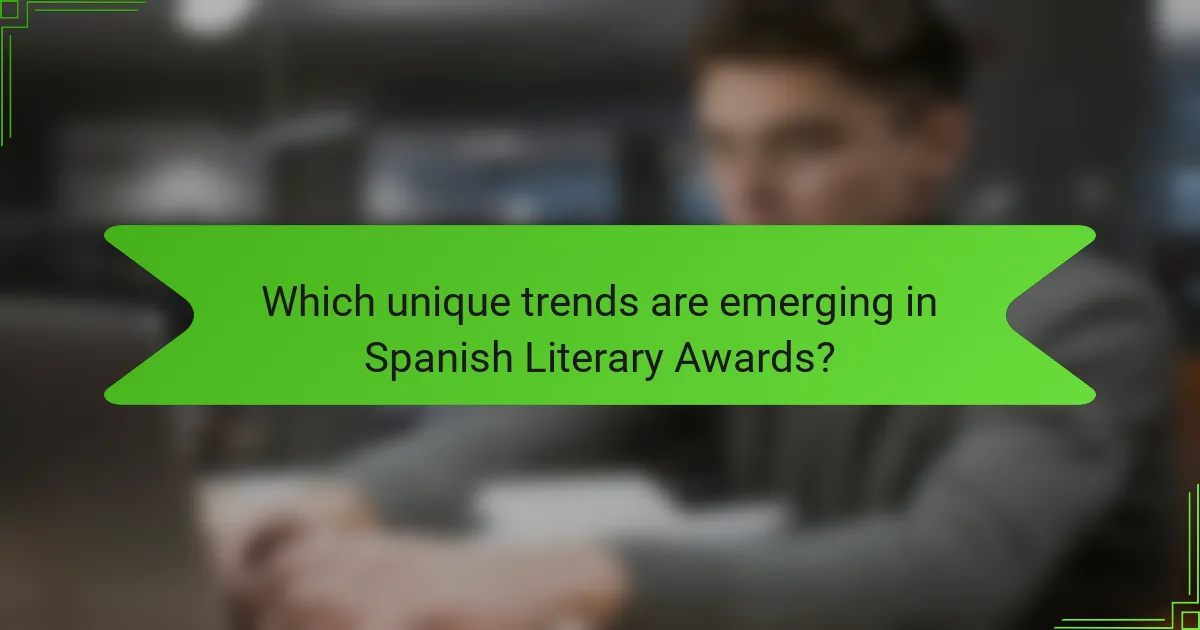
Which unique trends are emerging in Spanish Literary Awards?
Emerging trends in Spanish Literary Awards focus on digital adaptations, inclusivity, and the rise of self-publishing. Digital platforms are reshaping how awards are presented and accessed, enhancing visibility for diverse voices. This shift reflects a unique attribute of modern literary recognition, as traditional boundaries dissolve in favor of broader representation. Additionally, awards are increasingly recognizing works from independent authors, showcasing a rare trend that emphasizes innovation and creativity in literature.
How are awards recognizing diverse voices and genres?
Awards recognizing diverse voices and genres increasingly highlight the contributions of underrepresented authors in Spanish literature. These awards adapt to digital platforms, enhancing accessibility and engagement. For example, online voting and social media campaigns amplify visibility for diverse narratives. Additionally, trends show a rise in awards specifically targeting gender, ethnicity, and regional representation, reflecting broader cultural shifts. Digital adaptations include virtual ceremonies and live-streamed discussions, fostering community and dialogue around diverse literary expressions.
What innovative partnerships are being formed between awards and tech companies?
Innovative partnerships are emerging between Spanish literary awards and tech companies to enhance engagement and accessibility. These collaborations leverage digital platforms for broader reach and interactive experiences. For instance, awards are utilizing social media and mobile apps to connect with audiences, increasing participation and visibility. Additionally, tech companies provide tools for data analytics, helping awards measure audience engagement effectively. This synergy is transforming traditional award ceremonies into dynamic, multi-platform events.
How are awards adapting to changes in reader preferences and consumption habits?
Awards are increasingly embracing digital platforms to align with evolving reader preferences and consumption habits. This shift includes online voting systems, virtual ceremonies, and social media engagement to reach broader audiences.
Digital adaptations allow awards to showcase diverse literary voices, enhancing accessibility. Readers can participate in discussions and share their opinions instantly, creating a sense of community. Additionally, data analytics help organizers understand trends in reader engagement, guiding future award criteria.
The integration of multimedia elements, such as author interviews and book trailers, enriches the award experience. This approach caters to visual learners and those who consume content through various digital formats.
Overall, Spanish literary awards are transforming to remain relevant, ensuring they resonate with contemporary readers while celebrating literary excellence.
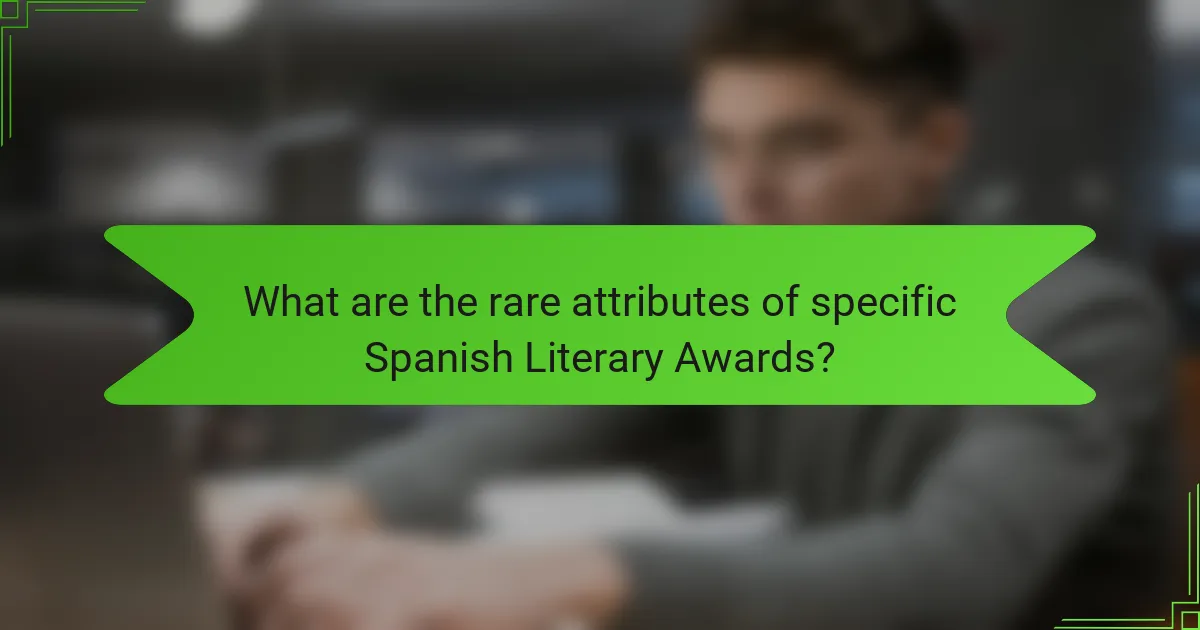
What are the rare attributes of specific Spanish Literary Awards?
The rare attributes of specific Spanish Literary Awards often include unique judging criteria, exclusive eligibility requirements, and distinctive prize formats. For instance, the Premio Planeta de Novela emphasizes commercial viability alongside literary merit, making it unique. The Premio Nadal is noted for its long-standing tradition, having been awarded since 1944, which adds historical significance. Additionally, some awards, like the Premio de Novela Corta, focus on shorter works, a rarity in literary awards. Other awards may incorporate digital elements, such as online voting or virtual ceremonies, reflecting modern trends in adaptation.
Which awards have unique criteria that set them apart?
Several Spanish literary awards have unique criteria that distinguish them from others. The Premio Planeta de Novela, for instance, emphasizes the commercial viability of the submitted works, rewarding authors for both literary quality and market potential. The Premio Nadal, on the other hand, is notable for its long-standing tradition and is awarded to unpublished novels, promoting new voices in literature. Additionally, the Premio de Novela Corta is distinct as it specifically targets shorter narratives, encouraging concise storytelling. These variations reflect the diverse landscape of Spanish literature and the different values each award promotes.
What notable collaborations have occurred between awards and literary festivals?
Notable collaborations between awards and literary festivals include joint events, sponsorships, and award presentations. These partnerships enhance visibility and engagement for both entities. For example, the Premio Planeta de Novela often collaborates with the Barcelona Book Fair, creating a platform for authors to showcase their work. Additionally, the Hay Festival has partnered with various literary awards to host discussions and workshops, enriching the festival experience and promoting award-winning authors. Such collaborations foster community and elevate the profile of literature in Spain.
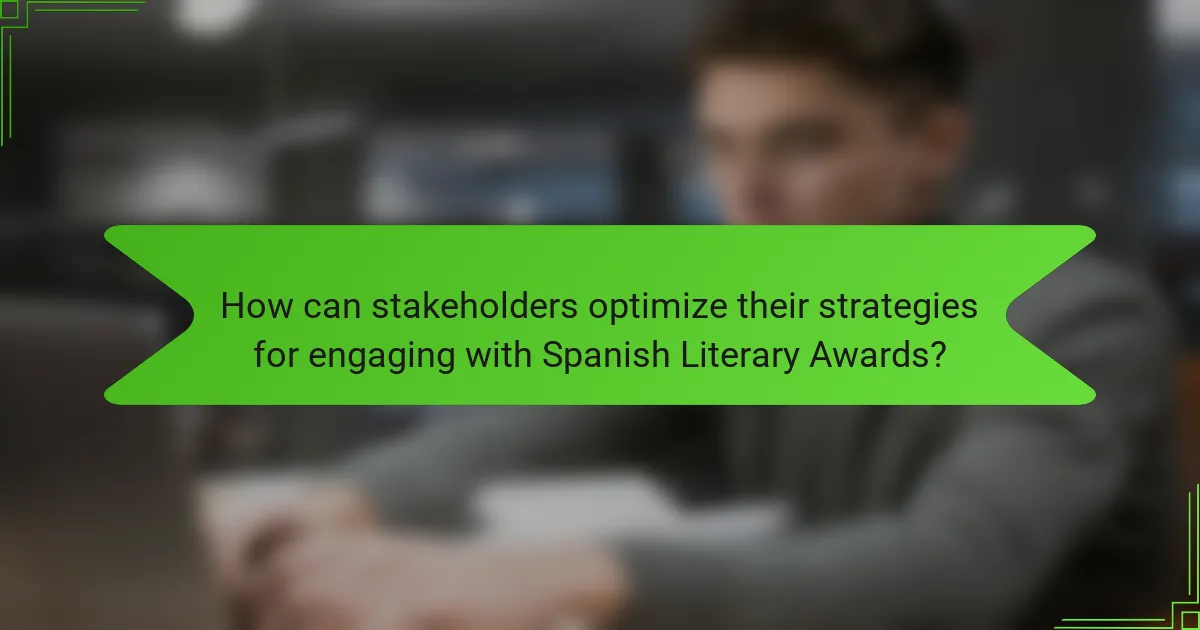
How can stakeholders optimize their strategies for engaging with Spanish Literary Awards?
Stakeholders can optimize their strategies by embracing digital platforms and engaging with diverse audiences. Utilizing social media enhances visibility and fosters community interaction. Analyzing data from previous awards reveals trends that can inform future engagement tactics. Collaborating with influencers in the literary field can amplify outreach and attract new participants. Adapting to digital formats, such as virtual ceremonies, increases accessibility and participation.
What best practices should authors follow when submitting for awards?
Authors should follow specific best practices when submitting for awards to enhance their chances of success. First, they should thoroughly research the award criteria and guidelines to ensure compliance. Next, tailoring submissions to highlight relevant themes and achievements is crucial. Additionally, authors should submit polished work, paying attention to formatting and presentation. Networking and seeking feedback from peers can provide valuable insights. Lastly, authors must respect deadlines and maintain professionalism throughout the process.
How can publishers enhance their visibility through award participation?
Participating in literary awards enhances publishers’ visibility by elevating their brand recognition and credibility. Awards provide a platform for showcasing quality works, attracting media coverage, and engaging with a wider audience. Digital adaptations of these awards, such as online voting and virtual ceremonies, further increase accessibility and participation. This trend allows publishers to connect with readers and industry professionals, amplifying their reach and influence in the literary community.
What common pitfalls should candidates avoid when entering awards?
Candidates should avoid common pitfalls like lack of research, poor presentation, and ignoring guidelines. Understanding the specific criteria of each award is crucial. Many candidates overlook the importance of tailoring submissions to reflect the award’s focus. Additionally, neglecting deadlines can disqualify entries. Finally, failing to seek feedback before submission can result in missed opportunities for improvement.
